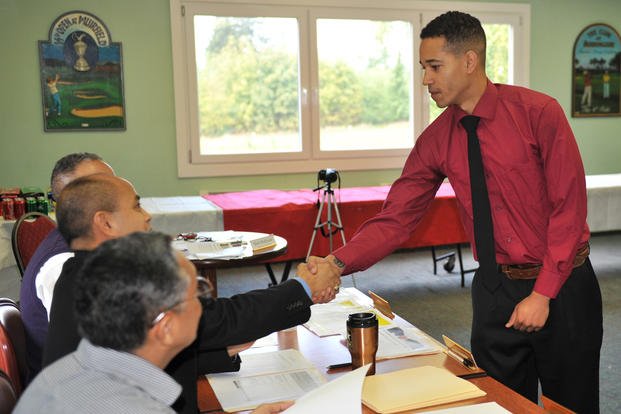Job interviews can be a daunting experience, but with the proper preparation, you can learn strategies that can help you ace an interview.
There's no such thing as a second chance to make a first impression so it's critical that you take the time to do your research and create a battle plan that will help you overcome some of your interview weaknesses.
So you've landed an interview? Great. Now the real work begins. Here are some tips to help you prepare:
1. Don't Be Late.
"If you're on time, you're late." You've heard that countless times in your military career. It holds true today. In fact, if your interview is within reasonable driving distance, it's a good idea to actually drive the route.
As reliable as Google Maps is, it's still a good idea to be prepared. Getting there early gives you time to relax, go over your interview notes one last time and use the bathroom to make sure you look squared away (be sure your shoes are clean and polished, and you don't have any food in your teeth).
Related: Search for Veteran Jobs
2. Don't Criticize Past Employers
It's an interview standard to be questioned about your previous employers. Even if you have legitimate grievances against a former boss or colleague, this is not the time to air them. Negativity, even when in tandem with your interviewer, is still negativity. Formulate how you can stay positive and try to turn the conversation to skills you learned and contributions you made.
3. Don't Um and Ah
Let's face it. Unless you were a PAO (public affairs officer), you likely don't have a great deal of experience speaking in public. The good news is that you don't need a college degree to become an excellent public speaker during interviews.
Avoid "ums," "ahs" and other filler words as much as possible. If you are not quite sure of your next word, simply take a pause to think. If you need to, clarify the question with the interviewer to give yourself time to think.
In fact, a thoughtful pause might make the interviewer have the impression that you are really taking a moment to consider the question they are asking instead of just immediately rambling on with the first thing that pops into your head.
The key to mastering speaking for an interview is to practice. It's highly recommended you practice in front of someone, or at the least, record yourself while answering some common interview questions. Keep practicing until you're confident you can eliminate filler words from your conversation.
4. Don't Give Generic Answers
Always, always, always be specific. If you say, "I'm an excellent communicator," make sure you follow with specific examples about how you've demonstrated excellent communication skills. Anyone can rattle off a list of positive sounding traits, but you need to show them how you will be good for the role with evidence and examples.
For example, the question, "What makes you a good team player?" shouldn't just be answered with, "Well, I work good with others, I have a positive attitude and I am a hard worker." You should answer with a story about a project that you worked on with a team and the way you contributed to that team to complete it successfully.
5. Don't Say You Have No Questions
Any time you are asked whether you have any questions, ask a question. During your interview preparation, compile a list of questions you have about the company and the role. A couple of good fallback questions are, "Why did you choose to work here?" or, "What excites you most about the company's future?"
Your questions will indicate that you've thought more about what this job might be like or what you're looking for in a job than just getting one for the paycheck. You can indicate more of what you'll bring to the table. You also should avoid saying the following:
- "Honestly" This is something that has entered our common vernacular. Take a moment to erase this from your vocabulary. When you say this, it implies that anything you said previously was not true.
- "No ... absolutely ..." Linking a negative with a positive is a no-no. Often, people say this while they are trying to figure out how to respond to a question about a previous workplace experience or scenario.
- "Between you and me ..." This is an aside and saying it implies an intimacy that is inappropriate at a job interview.
Related: Does your resume pass the 6-second test? Get a FREE assessment.
-- Sean Mclain Brown can be reached at sean.brown@military.com. Follow him on Twitter at @seanmclainbrown
The Final Step: Find the Right Veteran Job
Whether you want to polish up your resume, find veteran job fairs in your area, or connect with employers looking to hire veterans, Military.com can help. Sign up for a free Military.com membership to have job postings, guides and advice, and more delivered directly to your inbox.












